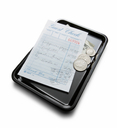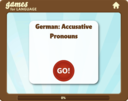
German Language Game: "Bitte zahlen"
Quick German Language Game - "Bitte zahlen" (Please, I'd like to pay.)
Level: Beginner (A1)
Playing Time: 3 minutes
A fun online interactive German Language Game: To ask for the check in a café or restaurant.
Signal the waiter (Kellner) or waitress (Kellnerin), and say: "Excuse me!" (Entschuldigung!)
Then you say: "Please I'd like to pay." (Bitte, ich möchte zahlen.)
You'll learn 8 common words with the game sequence: Memory, Word Invaders, Shootout - and Flash Cards to test yourself. Have Fun!
Always say the German OUT LOUD after, or along with the speaker. It's the best way to improve your pronunciation.
For transactions with money, it's really good to know your numbers!
Her's our game to learn German Numbers from 1-20.
Vocabulary
- Entschuldigung - Excuse me
- bitte - please
- ich möchte - I'd like
- zahlen - to pay
- Hier bitte. - Here you are. ["here please"]
- das macht - that makes, that's
- neunzehn - nineteen/ 19
- Euro - euro, euros
More Than a German Language Game
And don't forget: You can practice German online for FREE with our 36-Scene German 1 Story: "Michael in Deutschland" and our 72-Scene German 2 Mystery Story Sequel: "Blüten in Berlin?".
(And - if you already know that "Blüten" means blossom in German - you'll learn that Blüten has still another meaning...). Just login HERE.
If you have any language questions - don't hesitate to contact us!
German Language Game: Word Order with "dass"
Quick German Language Game: Word Order with "dass"
Play this fun online Word Invader language game to learn and practice German word order with "dass" (called a "subordinate conjunction").
You'll learn the difference between "a simple sentence" and a sentence with "dass".
For example:
Du bist hier. (You are here.)
Ich bin froh, dass du hier bist. (I'm glad that you are here.)
The statement "...., dass du hier bist" is called a "dependent clause" and has a different word order than a simple sentence.
To compare the two Sentences:
Du bist hier.
Ich bin froh, dass du hier bist.
In a simple sentence, the verb follows the subject: Du bist ...
In a "dependent clause", the verb "bist" goes to the end: ... dass du hier bist.
Simple Sentences
- Du bist hier. - You are here.
- Du sprichst Deutsch. - You speak German.
- Du hast recht. - You are right.
- Du rufst bald zurück. - You call back soon.
Sentences with "dass"
- Ich bin froh, dass du hier bist. - I'm glad that you're here.
- Ich weiß, dass du Deutsch sprichst. - I know that you speak German.
- Ich glaube, dass du recht hast. - I believe that you're right.
- Ich hoffe, dass du bald zurückrufst. - I hope that you call back soon.
Vocabulary
- sein - to be
- du bist - you are (familiar)
- sprechen - to speak
- du sprichst - you speak (familiar)
- recht haben - to be right
- du hast recht - you're right (familiar)
- zurückrufen - to call back
- du rufst zurück (familiar)
- hoffen - to hope
- ich hoffe - I hope
- wissen - to know (a fact)
- ich weiß - I know
- glauben - to believe
- ich glaube - I believe
- froh sein - to be glad
- ich bin froh - I'm glad
Say the words and phrases OUT LOUD, right after or along with the speaker.
By playing this game, you'll also be working on your pronunciation.
If you like our games, please SHARE us with your friends.
More Than a German Language Game
And don't forget: You can practice German online for FREE with our 36-Scene German 1 Story: "Michael in Deutschland" and our 72-Scene German 2 Mystery Story Sequel: "Blüten in Berlin?".
(If you already know that "Blüten" means blossom in German - you'll learn that Blüten has still another meaning...).
Just register HERE. (Different from the Quick Games, you only need to register, so our program can get you back to where you left off.)
If you have any language questions - don't hesitate to contact us!

German Language Game: Ich heiße - My name is
German Language Game: "Ich heiße" - My name is (I'm called)
Level: Beginner (A1)
Playing Time: 3 minutes
Play a fun German language game to practice the conversational verb "heißen". You commonly use it to tell someone your name, or ask about someone's name.
Note that the German letter -ß- sounds like a double "s". The letter is called "esszett" or "scharfes ess", and is used after a long vowel, or a combination of two vowels, eg: "ei".
As you play, say the German OUT LOUD.
Heißen - Present Tense
• ich heiße - my name is
• du heißt - your name is (familiar)
• er/sie heißt - his/her name is
• Sie heißen - your name is (formal)
• wir heißen - our name is
• ihr heißt - your name is (plural)
• sie heißen - their name is
Vocabulary
• der Bruder - the brother
• mein Bruder - my brother
• die Schwester - the sister
• meine Schwester - my sister
• die Freundin - the friend (f), girlfriend
• deine Freundin - your girlfriend (familiar)
• Wie heißt du? - What's your name? (familiar)
• Wie heißen Sie? - What is your name? (formal)
Note: In informal situations, you could also say: "Ich bin ..." (I am ...).
The phrase "Mein Name ist ..."(My name is ...) is generally used in written language.
More Than a German Language Game
A quick reminder: You can practice German online for FREE with our 36-Scene German 1 Story: "Michael in Deutschland" and our 72-Scene German 2 Mystery Story Sequel: "Blüten in Berlin?"
("Blüten," of course, means blossoms in German. But the German word Blüten has still another meaning that may surprise you.)
Just login HERE.
And, if you have any language questions - don't hesitate to contact us!

German Language Game: Kaufen, Zahlen
Quick German Language Game: kaufen, zahlen (to buy, to pay)
Level: Beginner (A1)
Playing Time: 3 1/2 minutes
Play a quick German language game to learn the verbs "kaufen" and "zahlen" and to combine them with basic vocabulary into short sentences.
In the sentences, note the German word order. It's a little different from the English.
When you play the game, say the German out loud. It's the best way to improve your pronunciation.
Vocabulary
• kaufen - to buy
• zahlen - to pay
• ich möchte - I would like
• ich muss - I have to
• jetzt - now
• später - later
• bald - soon
• etwas - something
More Than a German Language Game
And don't forget: You can practice German online for FREE with our 36-Scene German 1 Story: "Michael in Deutschland" and our 72-Scene German 2 Mystery Story Sequel: "Blüten in Berlin?"
(If you already know that "Blüten" means blossom in German - you'll learn that Blüten has still another meaning...).
Just login HERE.
If you have any language questions - don't hesitate to contact us!

German Language Game: Accusative Pronouns
German Language Game - accusative pronouns
Level: Elementary (A2)
Playing Time: 4 minutes
Play a fun and quick German Language Game to learn and practice German Accusative Pronouns:
• mich (me)
• dich (you, familiar)
• ihn (him)
• sie (her)
• uns (us)
• euch (you-all)
• sie /Sie (them /you, formal)
1. Review the accusative pronouns with the Shootout Game.
2. Recall basic verbs that take the dative (a direct object).
3. Put together simple sentences using accusative pronouns with the Word Invader Game.
4. Choose the translation of sentences with the Deal No Deal Game.
If you understand accusative pronouns as direct objects and want to try out your German vocabulary, just play the game. Otherwise, read on below and then play.
Verbs with a Direct Object
sehen - to see
[ich sehe, du siehst, er/sie sieht, wir sehen, ihr seht, sie/Sie sehen]
kennen - to know, be acquainted with
[ich kenne, du kennst, er/sie kennt, wir kennen, ihr kennt, sie/Sie kennen]
suchen - to look for
[ich suche, du suchst, er/sie sucht, wir suchen, ihr sucht, sie/Sie suchen]
anrufen - to call (a *separable-prefix verb)
[ich rufe an, du rufst an, er/sie ruft an, wir rufen an, ihr ruft an, sie/Sie rufen an]
Separable Prefix Verbs
These are verbs that separate into two parts when used in the present and simple past tenses, as well as in the imperative.
For instance, the verb "rufen" (to call, shout) can add the separable prefix "an-".
The verb "anrufen" means "to call", specifically by telephone).
The prefix "an" goes to different positions, depending on the tense or mood of the verb. For example:
Present tense, Simple Past, and Imperative - the prefix goes at the end:
• Ich rufe dich sofort an.
(I'm calling you right away.)
• Er rief gestern sehr spät an.
(He called very late yesterday.)
• Ruf mich bitte an.
(Please call me.)
Future tense, and Present Conditional - the prefix stays attached:
• Ich werde dich heute Nachmittag anrufen.
(I'll call you this afternoon.)
• Ich würde dich gerne anrufen.
(I would like to call you.)
Perfect Tenses - the prefix stays attached to the past participle:
• Ich habe dich gestern angerufen.
(I called you yesterday.)
If you'd like a more detailed explanation of Separable and Inseparable Prefix Verbs, click here.
And, if you like our games, please SHARE us with your friends.
More Than a German Language Game
Remember: You can learn and practice German online for FREE with our 36-Scene German 1 Story: "Michael in Deutschland" and our 72-Scene German 2 Mystery Story Sequel: "Blüten in Berlin?"
("Blüten" means blossoms in German - but you'll find out that it has another, darker meaning).
Just login HERE.
And, if you have any language questions - don't hesitate to contact us!
